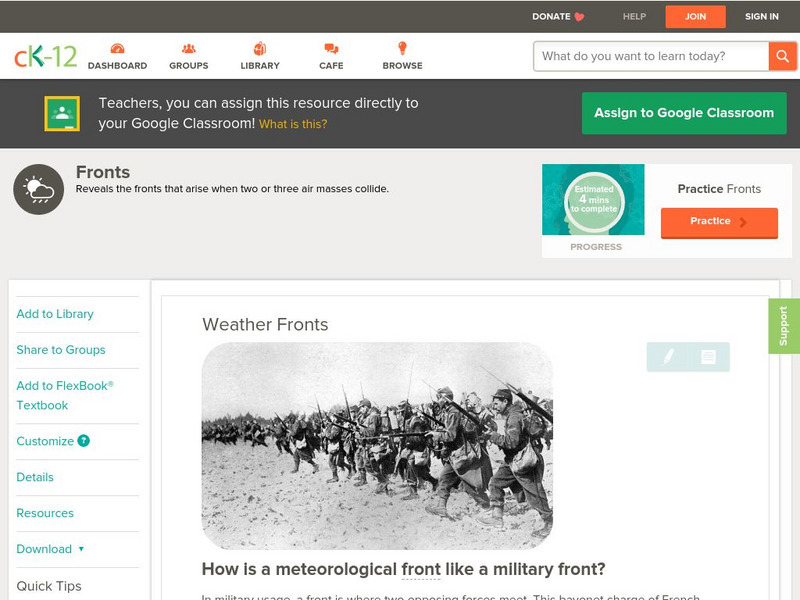Hi, what do you want to do?
Teach Engineering
Stormy Skies
Young meteorologists examine the four main types of weather fronts and how they appear on a weather map. Participants learn about the difference between the types of weather fronts along with their distinguishing features. A...
National Research Center for Career and Technical Education
STEM: Lou-Vee Air Car
A comprehensive lesson on acceleration awaits your physicists and engineers! Two YouTube videos pique their interest, then sample F=ma problems are worked and graphed. The highlight of the lesson is the building of a Lou-Vee air car!...
Curated OER
Impulse, Momentum, and the Conservation of Momentum
What happens when two worlds collide? In the first of several activities, future physicists experiment with colliding ball bearings or Newton's cradle. Another activity requires the use of an air track with cars to examine collision....
Curated OER
Unit IX: Worksheet 2 - Impulsive Force
Here are nine motion problems for physics fanatics to solve. Topics are pretty typical: rifles firing bullets, freight train cars colliding, astronauts gliding through space, balls being thrown. Pupils compute recoil speed, combined...
Curated OER
Determining Momentum and Energy Loss of Balls Colliding Against Different Surfaces
Students experiment with the bounce of balls on various surfaces. For this physics lesson, students use various surfaces to bounce balls to study the momentum. This hands-on activity with the concepts of elasticity of surfaces which is...
Curated OER
Hurricanes
Upper elementary meteorologists take a glance at what a hurricane is and how it is formed. Because this does not get into the differences in air pressure that drive the associated winds, it may not be useful for older learners. The...
Steinhardt Apps
Kinetic Molecular Theory
Building off young chemists' knowledge of the states of matter, kinetic molecular theory is the focus of the unit. Eight days of lessons including multiple demonstrations, one lab experiment, directed instruction, and worksheets,...
Office of the New Jersey State Climatologist
Play Ball! – Or Not…Making a Decision Using Weather Data
Should the game go on or not? An engaging lesson asks small groups to make a decision using weather data. After analyzing a map, an updated forecast, and radar information, groups have to decide whether to cancel a baseball game. They...
Curated OER
Predicting Storms and Weather
Young scholars use weather pattern worksheets to research how weather is predicted. In this weather prediction lesson plan, students predict the weather based on the wind, rain, currents, and other patterns.
Curated OER
Tornado in a Bottle
Young scholars learn about the causes and properties of tornados. Students create a simulation of a tornado and observe its characteristics.
Curated OER
Tornado Alley-- Night of the Twisters
In this science and geography worksheet, students read 2 pages of background information about Tornado Alley which may help them understand Night of the Twisters by Ivy Ruckman.
Bowels Physics
Impulse and Momentum
Be impulsive with your high school physics class. Emerging physicists review the slide presentation and learn about impulse, momentum, collisions, and how each variable may be affected. They complete practice problems and conclude with a...
Curated OER
Turbidy and Water
Students use observation skills in assessing the water quality of water samples in this activity and learn that the tastes and preferences of others can be different.
Curated OER
Newton's Second Law of Motion with Balance Toys
Students discuss acceleration and deceleration and participate in brief demonstrations of the Second Law of Motion. They apply the law to a metal balance toy and a plastic balance toy by applying the same force then with different forces.
Curated OER
Potential Energy
In this potential energy learning exercise, students determine the potential energy of objects, calculate the work due to conservative forces and the conservation of mechanical energy. This learning exercise has 7 problems to solve.
Utah STEM Foundation
Utah Stem Action Center: Air Masses
An air mass forms when the air over a large region of Earth sits in one place for many days. The air gradually takes on the characteristics of the land or water below it. Where Earth's surface is cold, the air becomes cold. Where Earth's...
CK-12 Foundation
Ck 12: Earth Science: Weather Fronts
[Free Registration/Login may be required to access all resource tools.] Describes the weather fronts that occur when two air masses collide. Includes downloadable handouts.
CK-12 Foundation
Ck 12: Earth Science: Weather Fronts
[Free Registration/Login may be required to access all resource tools.] Describes the fronts that occur when two air masses collide.






















